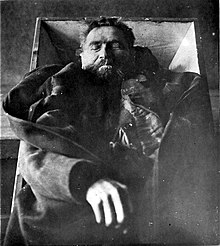Karl Denke: Difference between revisions
mNo edit summary |
mNo edit summary |
||
| Line 2: | Line 2: | ||
| name= Karl Denke |
| name= Karl Denke |
||
| image=Karl Denke.jpg |
| image=Karl Denke.jpg |
||
| caption=Only known fotograph of Karl Denke, after his suicide |
|||
| caption= |
|||
| birthname= |
| birthname= |
||
| alias= |
| alias= |
||
| Line 18: | Line 18: | ||
| mo = |
| mo = |
||
| motive = [[cannibalism]] |
| motive = [[cannibalism]] |
||
| apprehended= |
| apprehended= 22 December 1924 |
||
}} |
}} |
||
'''Karl Denke ''' (August 12, 1870 – December 22, 1924) was a [[serial killer]] from Germany. |
'''Karl Denke ''' (August 12, 1870 – December 22, 1924) was a [[serial killer]] from Germany. Among three notorious cases of [[cannibalism]] in Germany in the 1920s ([[Fritz Haarmann]], [[Carl Großmann]] and Denke himself) his is the one with the most victims |
||
Denke was born in Münsterberg/[[Silesia]] in [[Germany]], today's [[Ziębice]] in [[Poland]]. There is not a great deal of information about his early life, but in adulthood he was well liked in his community, and worked as an [[Organ (music)|organ]] player at the local church. |
Denke was born in Münsterberg/[[Silesia]] in [[Germany]], today's [[Ziębice]] in [[Poland]]. There is not a great deal of information about his early life, but in adulthood he was well liked in his community, and worked as an [[Organ (music)|organ]] player at the local church. |
||
Revision as of 08:39, 17 February 2010
Karl Denke | |
|---|---|
 Only known fotograph of Karl Denke, after his suicide | |
| Cause of death | Suicide |
| Motive | cannibalism |
| Details | |
| Victims | 30 |
Span of crimes | 1903–1924 |
| Country | Germany |
Date apprehended | 22 December 1924 |
Karl Denke (August 12, 1870 – December 22, 1924) was a serial killer from Germany. Among three notorious cases of cannibalism in Germany in the 1920s (Fritz Haarmann, Carl Großmann and Denke himself) his is the one with the most victims
Denke was born in Münsterberg/Silesia in Germany, today's Ziębice in Poland. There is not a great deal of information about his early life, but in adulthood he was well liked in his community, and worked as an organ player at the local church.
On December 20, 1924, Denke was arrested after attacking a man at his house with an axe. Police searched Denke's home and found human flesh in huge jars of curing salts. A ledger contained the details of 30 people Denke had murdered and cannibalized over the years. It is thought he even sold the flesh of his victims at the Breslau (today's Wrocław) market.
The day after his arrest, Denke hanged himself in his cell, meaning his exact motives can only be guessed at.
External links
- Short biography, other short articles: [1] and [2]
- biography in polish
- German people stubs
- Crime biography stubs
- 1870 births
- 1924 deaths
- Serial killers who committed suicide
- German serial killers
- German cannibals
- German people who died in prison custody
- Prisoners who died in German detention
- Suicides by hanging in Germany
- People who committed suicide in prison custody
- Incidents of cannibalism
